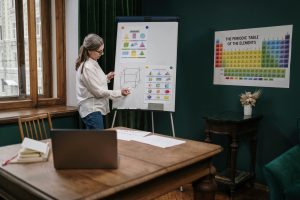Exploring the Transformative Power of Critical Thinking Skills
If there is one skill that is increasingly important in today’s fast-paced, information-rich world, it’s critical thinking. In a world full of constant distractions and noise, the ability to think critically is more necessary than ever. It’s the skill that allows us to make sense of the world, sift through all the data and information, and come to our own logical and well-informed conclusions. So, what exactly is critical thinking and why is it so important? In this article, we will explore the transformative power of critical thinking skills and why it’s crucial to develop them in our personal and professional lives.
The Definition of Critical Thinking
Critical thinking is the process of objectively analyzing, evaluating, and synthesizing information to form a judgment or make a decision. It goes beyond simply accepting information at face value and requires actively and skillfully conceptualizing, applying, analyzing, and evaluating the information to come to a well-informed conclusion.
The Components of Critical Thinking
There are four main components of critical thinking: analysis, interpretation, inference, and evaluation.
Analysis
The first component, analysis, involves breaking down complex information into smaller, more manageable parts. It requires thinking carefully about the parts and understanding how they relate to each other to form a whole. This step is crucial in understanding the underlying concepts and ideas in any given situation.
Interpretation
The second component, interpretation, involves making sense of the information by examining and explaining its meaning, context, and significance. It’s about digging deeper and trying to understand the underlying assumptions, biases, and implications of the information at hand.
Inference
The third component, inference, involves taking the information and using it to come to a conclusion or make a prediction. It requires thinking critically about cause and effect, identifying patterns and trends, and using evidence to support your findings.
Evaluation
The final component, evaluation, involves critically assessing the information and determining its credibility, accuracy, and relevance. It’s about questioning the source of the information, the evidence presented, and any potential biases that may exist.
The Benefits of Critical Thinking
The ability to think critically has numerous benefits, both in our personal and professional lives. Here are some of the key advantages of developing strong critical thinking skills:
Better Decision Making
By carefully analyzing and evaluating information, critical thinking helps us make informed and logical decisions. We are less likely to be swayed by emotions or biases and more likely to come to the best possible outcome based on the facts presented.
Effective Problem Solving
Critical thinking allows us to approach problems and challenges in a systematic and logical manner. By breaking down complex issues into manageable parts, we can better understand the root cause of the problem and develop effective solutions.
Improved Creativity
Critical thinking involves looking at things from different perspectives and challenging conventional thinking. By thinking critically, we open ourselves up to new and innovative ideas that can lead to creative solutions and approaches.
Enhanced Communication Skills
By thoroughly analyzing and evaluating information, critical thinking helps us communicate more effectively and persuasively. We are better able to articulate our ideas, provide evidence to support our arguments, and consider alternative perspectives.
How to Develop Critical Thinking Skills
Like any skill, critical thinking can be learned and developed over time. Here are some tips to help you improve your critical thinking skills:
Ask Questions
Asking questions is a crucial part of critical thinking. When faced with new information, ask yourself questions such as: What information am I being presented with? What is the source of the information? Are there any biases present? What evidence supports this information? These questions can help you better understand and analyze the information.
Consider Alternative Perspectives
It’s easy to fall into the trap of thinking there is only one correct answer or solution. However, critical thinking involves considering different viewpoints and perspectives. Challenge your own thinking by looking at things from different angles and considering alternative opinions.
Learn from Others
Collaborating with others can help you develop critical thinking skills. Engage in discussions, debates, and brainstorming sessions with people who have different backgrounds and perspectives. This can help you see things from a different point of view and challenge your own thinking.
Practice, Practice, Practice
Like any skill, critical thinking takes practice. Continuously challenge yourself to think critically by analyzing and evaluating information in everyday situations. The more you practice, the better you will become.
Conclusion
In today’s complex and rapidly changing world, the importance of critical thinking cannot be overstated. By developing and honing this skill, we can better navigate the vast amount of information available to us and make informed decisions that can have a positive impact on both our personal and professional lives. So, let’s embrace critical thinking and explore its transformative power.










